I'm building a HMAC API and I have issues testing the hashing with Paw.
On Paw I have this payload:
GET:/hello/world:"":9a6e30f2016370b6f2dcfb6880501d7f2305d69bout
and a custom HMAC-SHA256 variable (actually function like this that sets it in the X-Hash header.
X-Hash: 4Cq2yehWumDcUk1dYyfhm6qWjJVBkOCB8o12f5l0WGE=
In my PHP API I have the same thing:
GET:/hello/world:"":9a6e30f2016370b6f2dcfb6880501d7f2305d69bout
and used:
hash_hmac('sha256', $this->getPayload(), '9a6e30f2016370b6f2dcfb6880501d7f2305d69bout', false);
So when comparing the hashes:
Paw: 4Cq2yehWumDcUk1dYyfhm6qWjJVBkOCB8o12f5l0WGE=
PHP: 6961b9d1f6e986c49d963cbebd691fa68dfa59b4ce3b7f05320c2d43eae3c7c3
They are very different. Any idea why is that?
Update
Paw Code:
function evaluate(context){
var loc = getLocation(context.getCurrentRequest().url);
var payload = "";
payload += context.getCurrentRequest().method + ':';
payload += loc.pathname + ':';
payload += JSON.stringify(context.getCurrentRequest().body) + ':';
payload += "9a6e30f2016370b6f2dcfb6880501d7f2305d69bout"; // Private key
return payload;
};
function getLocation(href) {
var match = href.match(/^(https?\:)\/\/(([^:\/?#]*)(?:\:([0-9]+))?)(\/[^?#]*)(\?[^#]*|)(#.*|)$/);
return match && {
protocol: match[1],
host: match[2],
hostname: match[3],
port: match[4],
pathname: match[5],
search: match[6],
hash: match[7]
}
}
PHP Code (with lots of comments):
if (strpos(strtoupper($authHeader), 'HMAC') !== 0) {
echo 'out';
throw new HttpForbiddenException();
}
else {
$hmacSignature = $app->request->headers()->get('X-Hash');
$publicKey = $app->request->headers()->get('X-Public');
if ( empty($hmacSignature) || empty($publicKey) ) {
echo 'out2';
throw new HttpForbiddenException();
}
else {
$this->hmacManager->setPublicKey($publicKey);
print '$publickey = ' . $publicKey . '<br>';
// Validate if base64_encoded or not
if( base64_decode($hmacSignature, true) !== FALSE ) {
$binaryString = base64_decode($hmacSignature);
$hmacSignature = bin2hex($binaryString);
print 'decoding ' . '<br>';
}
$this->hmacManager->setHmacSignature($hmacSignature);
print '$hmacSignature = ' . $hmacSignature . '<br>';
$this->hmacManager->setRequestMethod($app->request->getMethod());
print 'method = ' . $app->request->getMethod() . '<br>';
$this->hmacManager->setRequestResourceUri($app->request->getResourceUri());
print 'uri = ' . $app->request->getResourceUri() . '<br>';
$requestBody = $app->request()->getBody();
if (Utils::isJson($requestBody)) {
$requestBody = json_decode($requestBody);
}
$this->hmacManager->setRequestBody(json_encode($requestBody));
print 'body = ' . json_encode($requestBody) . '<br>';
print 'private key = ' . $this->hmacManager->getPrivateKey() . '<br>';
$payload = '';
$payload .= $this->hmacManager->getRequestMethod() . ":";
$payload .= $this->hmacManager->getRequestResourceUri() . ":";
$payload .= $this->hmacManager->getRequestBody() . ":";
$payload .= $this->hmacManager->getPrivateKey();
print 'PHP payload [' . $payload . ']';
$this->hmacManager->setPayload($payload);
$hmacValue = $this->hmacManager->generateHmac();
$isValid = $this->hmacManager->isValid($this->hmacManager->generateHmac(), $hmacSignature);
if ($isValid !== true) {
echo 'out3';
throw new HttpForbiddenException();
}
}
}
generateHmac from another class:
public function generateHmac()
{
print 'Generating HMAC' . '<br>';
$algorithm = $this->getAlgorithm();
print 'algo ' . $algorithm . '<br>';
$privateKey = $this->getPrivateKey();
print 'privk ' . $privateKey . '<br>';
if (empty($algorithm)) {
throw new \RuntimeException('Algorithm must be set and not empty');
} elseif (empty($privateKey)) {
throw new \RuntimeException('Private key must be set and not empty');
}
print 'payload ' . $this->getPayload() . '<br>';
$hash = hash_hmac($this->getAlgorithm(), $this->getPayload(), $this->getPrivateKey(), false);
print 'php hasj: ' . $hash . '<br>';
return $hash;
}
Finally, here's the output statements:
$publickey = 95f97b93560f951b4cae46c86d03d9b1a81d4ae8
decoding
$hmacSignature = e02ab6c9e856ba60dc524d5d6327e19baa968c954190e081f28d767f99745861
method = GET
uri = /hello/world
body = ""
private key = 9a6e30f2016370b6f2dcfb6880501d7f2305d69bout
PHP payload [GET:/hello/world:"":9a6e30f2016370b6f2dcfb6880501d7f2305d69bout]
Generating HMAC
algo sha256
privk 9a6e30f2016370b6f2dcfb6880501d7f2305d69bout
payload GET:/hello/world:"":9a6e30f2016370b6f2dcfb6880501d7f2305d69bout
php hash: 6961b9d1f6e986c49d963cbebd691fa68dfa59b4ce3b7f05320c2d43eae3c7c3
Hope it helps!
